



Flows of signs on a network Robert Marty First European Congress on Cognitive Science ECCS'95, Saint Malo 1995, April To think with accuracy about collective cognition it is necessary to define with precision the subject of this cognition. This latter is not a totality of separate individual subjects constituted by the unique common reference to an object or several objects of knowledge. The notion of network is not required only to constitute collective individual entities; it is also necessary to form the basis of the individual cognition on which collective cognition is based in its turn. For a rigorous approach to collective cognition, we believe that it is therefore necessary to take social networks into consideration on the one hand and the semiotic fact that is coextensive to each acquisition of knowledge on the other hand. 1 Networks, signs and cognition. 1.1 Networks. 1.2 Signs. It is now advisable to expose briefly and in a more precise manner the triadic conception of the sign that we will implement.
War on Society New Page 1 7 Secrets of the Super Organized A few years ago, my life was a mess. So was my house, my desk, my mind. Then I learned, one by one, a few habits that got me completely organized. Am I perfect? So what’s the secret? Are these obvious principles? If your life is a mess, like mine was, I don’t recommend trying to get organized all in one shot. So here are the 7 habits: Reduce before organizing. If you take your closet full of 100 things and throw out all but the 10 things you love and use, now you don’t need a fancy closet organizer. How to reduce: take everything out of a closet or drawer or other container (including your schedule), clean it out, and only put back those items you truly love and really use on a regular basis. Write it down now, always.
Jews sans frontieres 10 simple ways to save yourself from messing up your life - Step Stop taking so much notice of how you feel. How you feel is how you feel. It’ll pass soon. What you’re thinking is what you’re thinking. It’ll go too. Adrian Savage is a writer, an Englishman, and a retired business executive, in that order. Read full content
JohnPilger.com - the films and journalism of John Pilger nsnbc | nsnbc – no spin news – english Neither advocate nor oppose - Communist Party of Great Britain Marshall Plan: was it bourgeois internationalism? In his recent two-part article on Keynesianism, Mike Macnair argues that (a) Keynesianism is inherently nationalistic, (b) it is internally incoherent, (c) it did not actually work during the post-war boom, (d) the conditions causing the post-war boom are not reproducible, and so (e) Keynesian policies cannot work today. [ 1] He concludes that Marxists should not support Keynesian solutions. Instead, he argues the need for the adoption of a set of minimum demands, and the rebuilding of working class organisations on a European-wide basis. Inflation and wages Mike says Keynes emphasised his agreement with the marginalists on the necessity to reduce real wages. In the depression, prices fell significantly. However, this does not necessarily mean a reduction in real wages. And, if we look at the experience of where Keynes’s ideas were applied during the 1930s - in the US, during the ‘new deal’ - we see something very much like that. Failure?
The future is here: Driverless airport pods a reality Heathrow airport has rolled out its new driverless transport pods / Heathrow Airport Ltd To access our Premium Content,please login or subscribe, it's quick and easy THE future of public transport has finally arrived with Heathrow Airport officially unveiling laser-guided travel pods. The world's first fully-automated ULTra Personal Pod cars, designed by Advanced Transport Systems, were found to cut the time it takes passengers to move from the terminal to the car park by 60 per cent during a recent trial. In pictures: The driverless pods Scroll down for video The UK invention is the culmination of over 60 years of development. Promoted as being immune to accidents and traffic jams, using thinner roads and requiring no drivers, they are being hailed as the future of transport. The airport's fleet of 21 pods will take passengers to the correct terminal using information from their frequent flyer cards or by typing their flight details into the computer, with no stops in between.
New Politics